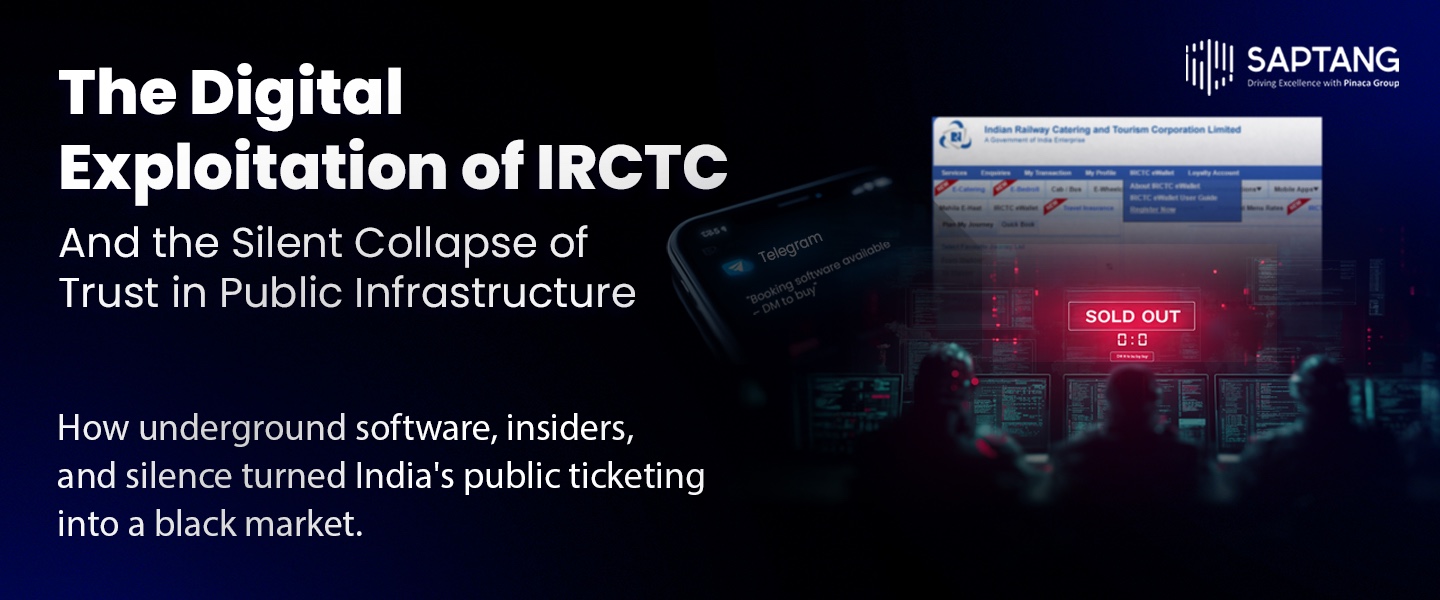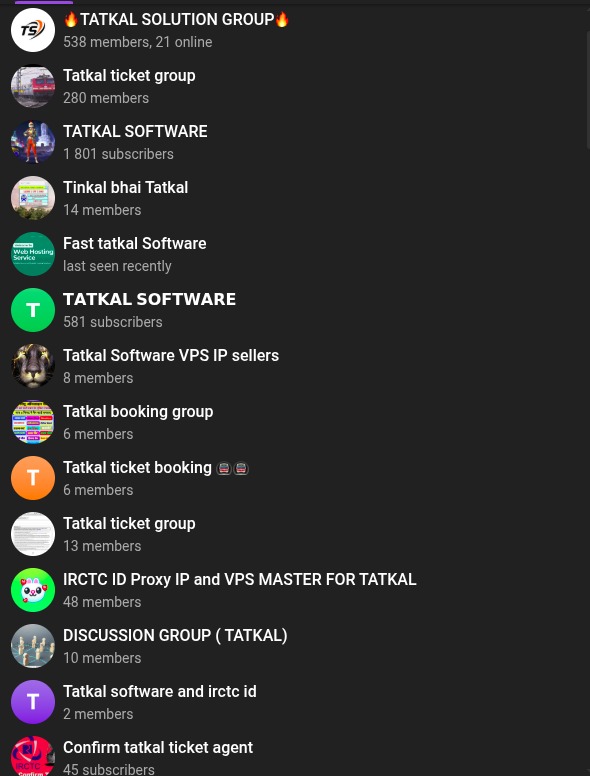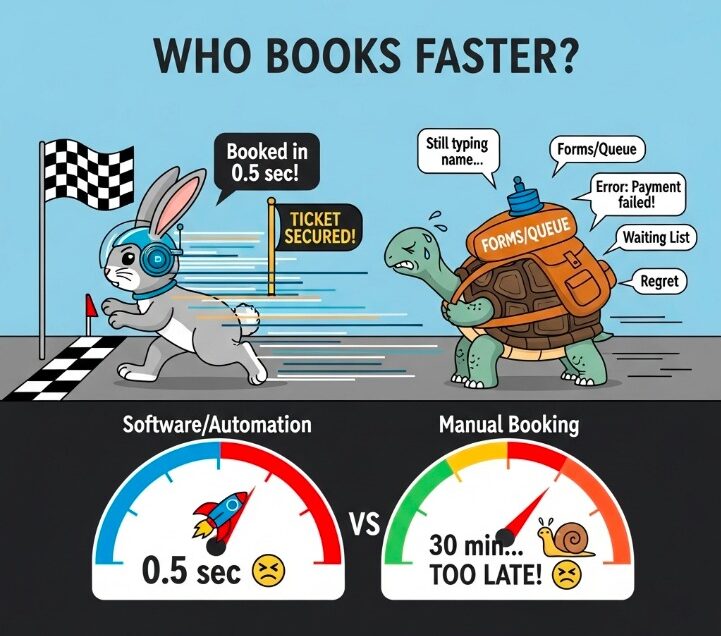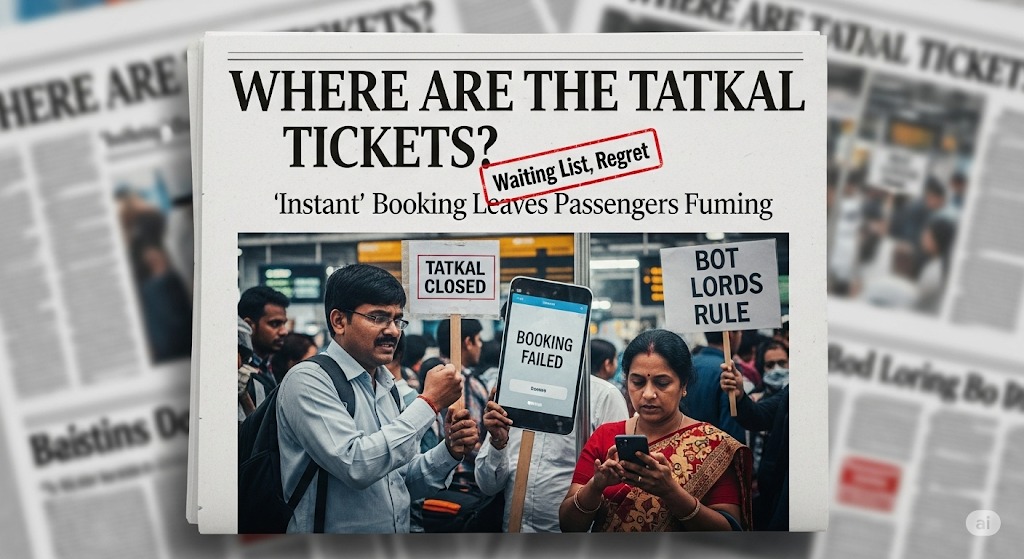
By Hariharan R, Cyber Researcher
In a nation where over 23 million people rely on Indian Railways each day, the digital transformation of services like IRCTC was meant to usher in convenience, fairness, and transparency. Tatkal tickets, introduced to support last-minute travelers, are one of the most time-sensitive and sought-after services on the IRCTC platform. However, over the past few years, this well-intentioned system has been quietly dismantled by a sprawling underground software ecosystem that is systematically exploiting it for profit and control.
As a cybersecurity firm, we undertook an ethical investigation into these exploitative practices. What we found was not just a story of bots or simple ticket sniping scripts, but a thriving, semi-manual, software-enabled shadow economy. This is an economy that requires technical sophistication, real-time human coordination, and possibly, the cooperation or silence of insiders within the railway system itself. What it reveals is not just a security failure, it is a collapse of governance, and a direct threat to the government’s credibility in the age of Digital India.
It began innocuously. We attempted to explore what happens behind the scenes when a tatkal ticket disappears seconds after booking opens. Through Telegram; a popular messaging platform known for encrypted channels and communities, we were flooded with vendors selling so-called “booking solutions.” For a few thousand rupees, they offered us custom software, remote installation support, and working IRCTC login credentials. Many such vendors sell not only the tools but provide tutorials, cracked versions, regular updates, and even performance guarantees.

This is not automation in the usual sense of AI bots doing all the work. The systems being used require user engagement. The software takes care of speed and repetition, but the operator must know how to time inputs, manage windows, process UPI transactions in real-time, and respond to changes in IRCTC’s interface. It is a semi-automated exploit, sustained by a well-practiced user base and an unregulated, resilient marketplace.

The core idea of Tatkal was to make a small pool of seats available for genuine emergencies a last-minute business trip, a family emergency, or urgent student travel. The IRCTC website allows bookings at a precise time each day, usually 10:00 AM for AC classes and 11:00 AM for non-AC. In this small window, the system is designed to handle millions of simultaneous requests fairly.
But fairness collapses when some users are equipped with software that pre-fills journey and passenger details, selects trains, bypasses basic CAPTCHAs, and even deploys multiple booking sessions simultaneously. These users, using unofficial IRCTC IDs—many of which are sold or recycled in these underground markets, can dominate the system, while genuine users without such tools are often left with nothing but error messages.
This is not merely a matter of personal inconvenience. It strikes at the heart of what a public digital service is supposed to ensure: equity of access.
Perhaps the most concerning finding was not the technology itself, but the signs of internal awareness and possible collusion. We observed repeated patterns suggesting certain IRCTC credentials are protected from deactivation, even after clear violations. Booking behaviors that should flag fraud detection systems seem to persist without disruption.
There are consistent rumors in private groups about backend access, administrative overrides, and credential generators being linked to insiders. While we cannot independently verify these claims yet, the pattern is worrying enough to merit attention from higher authorities. If even a small percentage of this exploitation is happening with the tacit support of internal stakeholders, it represents a systemic rot that digital policy must confront urgently.

What makes this issue particularly dangerous is that it undermines more than a railway booking portal. It undermines the promise of Digital India. IRCTC is not a niche service; it is a national platform, a flagship symbol of e-governance. When such platforms are exploited with impunity, it sends a clear message to the public: digital doesn’t mean democratic.
In the age of public dashboards, one-time passwords, and biometric verification, the public expects protection from manipulation. When tickets vanish in seconds day after day, it doesn’t take long before conspiracy theories take root. Eventually, frustration morphs into resignation, and resignation into cynicism. This cynicism will not remain limited to IRCTC. It will stain the image of all government services, especially those delivered through digital means.
The current state of the IRCTC platform reveals an urgent need for technological and procedural reform. At a minimum, the following vulnerabilities need to be addressed:
India has some of the best digital minds in the world. Our fintech landscape is thriving. Our biometric identity system, Aadhaar, is one of the most advanced globally. The problem here is not capacity. It is willpower.
Will the Ministry of Railways acknowledge this problem and act on it? Will IRCTC open its systems to audit? Will the government treat the abuse of a public digital platform as seriously as it treats financial fraud or cybercrime?
The answer to these questions will determine not just the fate of a train ticket booking system, but the credibility of digital governance itself.
The solutions exist, and many are not even prohibitively expensive. What is needed is a mandate for transparency, accountability, and rapid technical advancement. This should be followed by the creation of a multi-stakeholder task force including technologists, consumer advocates, cybersecurity experts, and enforcement agencies.
The black market for tatkal ticketing software isn’t just a nuisance; it’s an active threat to digital equality. If left unchecked, it will metastasize. Other government platforms may soon face similar abuses. The need to protect public digital infrastructure is no longer optional—it is essential.
The IRCTC ticketing crisis is not just about speed or competition; it is about fairness, access, and justice. If the only way to book a train ticket is to buy access to underground software and unofficial IDs, then we have failed in the promise of Digital India.
It is time for the government to act decisively. Not with patchwork fixes or PR statements, but with meaningful reforms that restore faith in public systems.
Until then, millions of ordinary Indians will continue to open the IRCTC website each morning, hoping for a fair shot—and losing to a system that was never built to protect them.